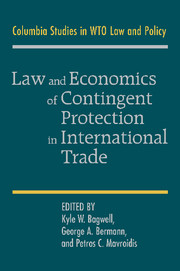Book contents
- Frontmatter
- Contents
- Contributors
- Introduction
- 1 An Overview of the Agreement on Subsidies and Countervailing Measures – Including a Discussion of the Agreement on Agriculture
- 2 Do the World Trade Organization Disciplines on Domestic Subsidies Make Sense? The Case for Legalizing Some Subsidies
- 3 Subsidies and Countervailing Measures: Determining the Benefit of Subsidies
- 4 The Enduring Problem of World Trade Organization Export Subsidies Rules
- 5 The Boeing–Airbus Dispute: A Case for the Application of the European Community State Aid Rules?
- 6 Antidumping: Overview of the Agreement
- 7 Price Differentiation in Antitrust and Trade Instruments
- 8 Nonpreferential Origin Rules in Antidumping Law and Practice
- 9 The Appellate Body Interpretation of “Sunset Reviews” Provisions of Anti-Dumping and Countervailing Measures Agreements: A Critical Analysis
- 10 The Safeguards Agreement – An Overview
- 11 Why Are Safeguards Needed in a Trade Agreement?
- Index
- References
3 - Subsidies and Countervailing Measures: Determining the Benefit of Subsidies
Published online by Cambridge University Press: 03 May 2010
- Frontmatter
- Contents
- Contributors
- Introduction
- 1 An Overview of the Agreement on Subsidies and Countervailing Measures – Including a Discussion of the Agreement on Agriculture
- 2 Do the World Trade Organization Disciplines on Domestic Subsidies Make Sense? The Case for Legalizing Some Subsidies
- 3 Subsidies and Countervailing Measures: Determining the Benefit of Subsidies
- 4 The Enduring Problem of World Trade Organization Export Subsidies Rules
- 5 The Boeing–Airbus Dispute: A Case for the Application of the European Community State Aid Rules?
- 6 Antidumping: Overview of the Agreement
- 7 Price Differentiation in Antitrust and Trade Instruments
- 8 Nonpreferential Origin Rules in Antidumping Law and Practice
- 9 The Appellate Body Interpretation of “Sunset Reviews” Provisions of Anti-Dumping and Countervailing Measures Agreements: A Critical Analysis
- 10 The Safeguards Agreement – An Overview
- 11 Why Are Safeguards Needed in a Trade Agreement?
- Index
- References
Summary
Introduction
The writers of the unfair trade laws captured the moral high ground early in the twentieth century and have held it ever since. It is one thing to argue for trade in general. It is another to argue for trade that is perceived as “unfair.” Indeed, Bhagwati (1988) has even gone as far as comparing the purchase of unfair goods to accepting stolen goods. In theory, the General Agreement on Tariffs and Trade (GATT) 1994 Agreement on Subsidies and Countervailing Measures (SCM Agreement) regime and its implementation in national law are supposed to be there to protect us all from unfair competition linked to subsidized trade. Whether they do or not is a matter open for debate (and academic research). The evidence is rather strong that in reality political forces manipulate these processes.
Although little noticed, the accountants captured the analytical high ground as countervailing duty (CVD) practice has evolved, seemingly at the expense of economic analysis. Indeed their approach was carried over, more or less intact, from U.S. law into the SCM Agreement. Since then, however (and as discussed later in this chapter), the World Trade Organization's (WTO's) Dispute Settlement Body (DSB) has placed emphasis on market-based interpretations of benefit.
What exactly is the benefit conferred by a subsidy? Somewhat tautologically, under Paragraph 1 of Article 1 of the SCM Agreement, a subsidy is defined as a “financial contribution by government” that confers a benefit.
- Type
- Chapter
- Information
- Publisher: Cambridge University PressPrint publication year: 2009



